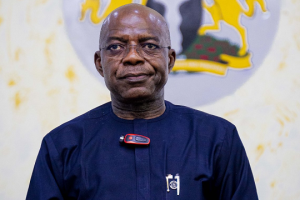
The Minister of Aviation and Aerospace Development, Festus Keyamo, has strongly criticized the Federal Competition and Consumer Protection Commission (FCCPC) for its recent remarks concerning Air Peace’s pricing strategies. According to Keyamo, the FCCPC’s comments were both reckless and misplaced.
In an interview on Arise TV on Sunday, Keyamo expressed his disapproval of the FCCPC’s public statement, which questioned the airline’s pricing structure. He argued that the Commission should have consulted the Nigeria Civil Aviation Authority (NCAA) before making such public pronouncements. The NCAA, he emphasized, is the primary regulatory body overseeing the aviation sector in Nigeria, particularly when it comes to matters like airline pricing and capacity.
Keyamo stated that the FCCPC’s failure to engage the NCAA before making public statements regarding Air Peace was a significant oversight. He explained, “I believe it was a very careless statement—without meaning to offend anyone—by the FCCPC. They should have reached out to the NCAA, which is the core agency responsible for regulating airlines. The NCAA holds the authority to oversee airlines’ pricing policies and ensure they comply with established regulations. If the FCCPC had contacted the NCAA, we could have provided them with the necessary data and context. Instead, they chose to single out a few airlines, which is unfair and counterproductive.”
He went on to highlight some of the underlying challenges facing Nigeria’s aviation industry, noting that capacity issues—not exploitation—were at the root of many of the problems being faced by airlines. According to Keyamo, one of the main struggles in the sector is the limited ability of Nigerian airlines to acquire aircraft, compounded by the high cost of servicing international routes. In addition, foreign exchange fluctuations significantly impact the operation costs for Nigerian carriers, as many aviation expenses, including aircraft purchase and maintenance, are denominated in foreign currencies.
“What we are dealing with in the aviation industry is a problem of capacity,” Keyamo explained. “Airlines struggle to acquire and maintain aircraft, and they are also affected by external factors like foreign exchange rates, which impact the cost of doing business. Most aviation-related expenses are dollar-based, so fluctuations in the value of the naira directly affect the cost of operations.”
He further elaborated on how the government is addressing these issues, specifically working to improve access to global markets for Nigerian airlines, enabling them to acquire aircraft at more favorable terms. Keyamo mentioned the government’s ongoing efforts to mitigate the impact of foreign exchange volatility on the sector, which is part of a broader strategy to reduce ticket prices and improve airline profitability.
“We are working on a solution to give Nigerian airlines access to better terms when acquiring aircraft,” he said. “This is crucial for reducing operational costs and, ultimately, for lowering ticket prices. We are also addressing the issue of foreign exchange volatility, which has been a major burden for airlines. This is why we’ve focused on the practice direction pursuant to the Cape Town Convention, which will give us more leverage in the global aviation market.”
In line with these efforts, Keyamo announced plans to lead a Nigerian delegation to Dublin to meet with global airline financiers. This engagement aims to secure better financing terms for Nigerian airlines, which will, in turn, positively impact ticket prices and overall service delivery. He emphasized that the international community has begun to take Nigeria’s aviation sector more seriously due to the country’s improved compliance score, which has risen from 49% to 75.5% for the first time in history.
“This improvement in our compliance score is a direct result of the policies introduced by President Bola Ahmed Tinubu,” Keyamo explained. “It’s a landmark achievement for Nigeria’s aviation sector, and it’s a key reason why major aircraft financiers are now eager to engage with us. This engagement will allow Nigerian airlines to access aircraft at better rates, which will lower operational costs and, ultimately, ticket prices.”
Keyamo also addressed the tension between protecting consumer interests and ensuring the survival of Nigerian airlines. He acknowledged that he occupies a delicate position, as he must balance the need to safeguard consumers’ rights with the imperative of ensuring that local airlines remain operational. “I am in a unique position because, on the one hand, I need to protect Nigerian consumers, including ensuring they have access to reasonably priced tickets,” he said. “On the other hand, I must ensure that our local airlines stay afloat. Over the past 40 years, more than 100 airlines have come and gone in Nigeria, and the mortality rate for airlines is very high. This administration is the first to address these issues head-on as part of its five-point agenda.”
Keyamo reaffirmed the government’s commitment to supporting local airlines, emphasizing that the focus is on enhancing their capacity rather than allowing foreign carriers to dominate the market. He argued that previous policies that allowed foreign airlines to take over the national carrier had been misguided and had undermined the growth of Nigeria’s aviation industry.
“Our policy shift is clear,” Keyamo asserted. “Instead of allowing foreign airlines to take over our market, we are focused on strengthening our local carriers. We are working to ensure that they have the capacity to thrive, and we are addressing both the challenges they face and the global factors that affect their operations.”
Finally, the Minister appealed to Nigerians to be patient as the government continues to address the challenges in the aviation sector. He emphasized that efforts are already underway to improve the situation and urged the public to trust that their concerns are being taken seriously. “We ask for your patience,” he said. “We are committed to improving the aviation sector and will continue to work closely with airlines and international partners to address the issues facing us.”
In conclusion, Keyamo reiterated that the government is focused on the long-term survival of Nigeria’s aviation industry, and that efforts to enhance the capacity of local airlines will ultimately benefit consumers by ensuring better services and more affordable tickets.





